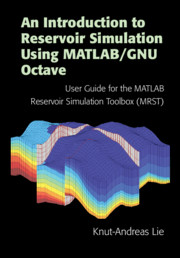 An Introduction to Reservoir Simulation Using MATLAB/GNU Octave
An Introduction to Reservoir Simulation Using MATLAB/GNU Octave Book contents
- Frontmatter
- Contents
- Preface
- 1 Introduction
- Part I Geological Models and Grids
- Part II Single-Phase Flow
- Part III Multiphase Flow
- 8 Mathematical Models for Multiphase Flow
- 9 Discretizing Hyperbolic Transport Equations
- 10 Solvers for Incompressible Immiscible Flow
- 11 Compressible Multiphase Flow
- 12 The AD-OO Framework for Reservoir Simulation
- Part IV Reservoir Engineering Workflows
- Appendix The MATLAB Reservoir Simulation Toolbox
- References
- Index
- Index
11 - Compressible Multiphase Flow
from Part III - Multiphase Flow
Published online by Cambridge University Press: 22 July 2019
- Frontmatter
- Contents
- Preface
- 1 Introduction
- Part I Geological Models and Grids
- Part II Single-Phase Flow
- Part III Multiphase Flow
- 8 Mathematical Models for Multiphase Flow
- 9 Discretizing Hyperbolic Transport Equations
- 10 Solvers for Incompressible Immiscible Flow
- 11 Compressible Multiphase Flow
- 12 The AD-OO Framework for Reservoir Simulation
- Part IV Reservoir Engineering Workflows
- Appendix The MATLAB Reservoir Simulation Toolbox
- References
- Index
- Index
Summary
The black-oil equations constitute the industry-standard approach to describe compressible three-phase flow. Black-oil models generally have stronger coupling between fluid pressure and the transport of phases/components than the two-phase, incompressible flow models discussed in the previous chapter. For this reason it is common to use a fully coupled solution strategy, in which the whole system of equations is discretized implicitly and all primary unknowns are solved for simultaneously. This chapter introduces you to the underlying physics and describes the various rock-fluid and PVT properties that enter these models, like formation-volume factors, dissolution and vaporization ratios, bubble-point pressures, saturated and undersaturated states, etc. We also explain the basics of how the resulting models are discretized and implemented in MRST. Our implementation will rely heavily on the discrete operators discussed earlier in book. We end the chapter simulating the SPE 1 benchmark case in MRST and a discussion of limitations and potential pitfalls for black-oil models.
Keywords
Information
- Type
- Chapter
- Information
- An Introduction to Reservoir Simulation Using MATLAB/GNU OctaveUser Guide for the MATLAB Reservoir Simulation Toolbox (MRST), pp. 337 - 412Publisher: Cambridge University PressPrint publication year: 2019
- Creative Commons
- This content is Open Access and distributed under the terms of the Creative Commons Attribution licence CC-BY-NC-ND 4.0 https://creativecommons.org/cclicenses/